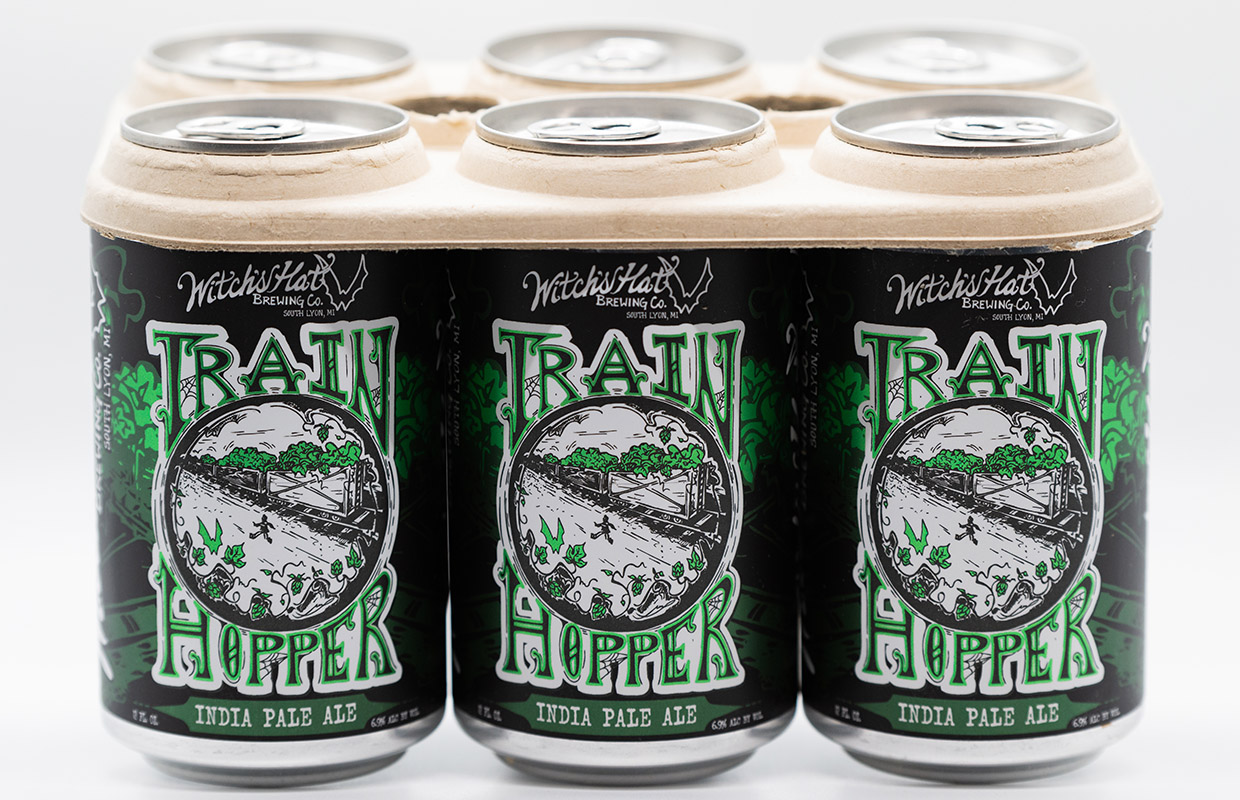
Finding unique and affordable ways to be greener and encourage sustainability while also endearing your company to a mindful consumer can be a few of the goals in establishing a packaging look for your brewery.
From newer types of boxed six-packs or making cans more recyclable, these breweries shared with Brewer what they have switched to, how it affected the bottom line and why it mattered to make the switch.
ZIPPERED LABELS
Horse & Dragon Brewing went through a pretty big search process trying to figure out ways to do less damage in getting its beer to its local market of Fort Collins, Colorado.
“Both bottles and cans have their issues, environmentally speaking, and can labels of any sort add an additional concern,” said co-founder Carol Cochran.
At H&D’s size (about 2,500 bbls/year), Cochran said they are unable to produce enough beer — or have enough storage — to order a full truckload (about 204,000 12-ounce cans) for one SKU.
In late 2018, Cochran said they couldn’t find a digital printer that would produce a small run of printed cans at what they deemed an affordable price. Horse & Dragon looked at both pressure-sensitive labels and shrink-wrapping as options, and Cochran said they do use both (shrink-wrapped cans for larger runs of 12-oz. cans, and stickers for specialty runs of 16 ouncers). The 12-ounce cans have added a “zipper” pull tag along the side to help consumers remove the shrink-wrap before recycling.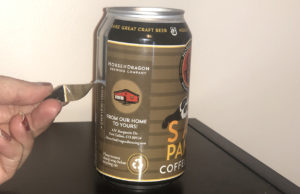
As smaller breweries increase the use of non-printed cans with labels, it can cause contamination of full bales of aluminum, more and more of which are being rejected at the reprocessors.
“Previously the percentage of cans that had shrink-wrap or PSL stickers were so minimal that they didn’t contaminate bales,” Cochran said. “As so many of us small fries enter the market with beverages of all sorts and as most consumers don’t realize that labels should be removed before recycling, the problem is increasing.
“So we try our best to keep educating consumers that plastic sleeves (and pressure-sensitive labels) should be peeled off of cans before they are recycled.”
Fellow Colorado brewery, Locavore Beer Works — located in Littleton, got into canning through friends at Tommyknocker, explained co-owner Andy Nelson.
“[Buying] our own canning line just wasn’t something we could justify given our size,” he said. “They had been discussing the idea of the removable labels in response to — at the time — increased concern about shrink-wrap plastic and recycling. We thought it was a great idea and our local printer, Columbine Label, was able to incorporate the zipper.”
Both breweries try to share the info of what to do with the cans after emptying them.
READ MORE: Sustainability Dreams That Drive These Craft Breweries
Horse & Dragon tries to make this fun through its #unzipwithme/#unzipwithus and #peeloffwithus campaigns on social media.
“We asked our shrink-wrapped can supplier (CanSource, located in Longmont) to add the perforation to our sleeves, and that “zipper” IS very satisfying to peel,” Cochran said, while the brewery’s sticker supplier (Leapin’ Lizard Labels in Fort Collins) has provided them with stickers whose adhesive tends to peel off of cans more easily.
In general, there are large price breaks for massive label orders, and saving a few cents on each would be really nice, Nelson said.
“However, we only need so many and are mostly unable to exercise a huge scale advantage,” he added.
Cochran noted that the price differential for small-batch cans versus a truckload is substantial. Horse & Dragon spends between 21-28 cents per 12-ounce can more than if they could afford the space and make the beer to fill a truckload of printed cans in a reasonable time frame.
“But in the long run, we sure hope to see more small-scale runs available as printed cans, which don’t then need as much help from consumers to recycle correctly,” she said. “Currently we are talking with a new-to-us supplier who is able to produce smaller amounts of printed cans that may work as a solution for us going forward.”
BIODEGRADABLE RINGS & HOLDERS
Ryan Cottongim of Witch’s Hat said creating a sustainable composting program is one of the South Lyon, Michigan brewery’s core values as a company.
“We are lucky to have the largest industrial composting facility (Tuthill Farms) in Michigan right in our town, so we have embraced composting as much as we can,” he said, noting that all of the food waste, food packaging containers, and brewery byproducts get composted or goes to farmers.
“It was just a no-brainer for us to do everything we can to keep all of our product in sustainable containers,” he said. “The E6PR was really the only option for us to follow our core values and stick to compostable products.”
The E6PR (Eco Six Pack Ring) labels its company as the first eco-friendly six-pack ring made from fiber by-product waste, designed to replace plastic rings and Cottongim said they buy them directly from the manufacturer, which is a small company.
When Witch’s Hat set out to start a packaging program, Cottongim said they knew they wanted to go this route.
“We did consider the hard plastic Paktek’s, but only if we could not make the E6PR work,” he said. “The E6PR’s are much more expensive in both cost and labor to apply. But any effort in sustainability costs a business money, and it was a cost that we incorporated into our pricing model and did everything we can to make it work.“
He added that they do believe the effort is worth it in the eyes of the consumer.
“If anything, it looks different than everything else on the shelf in Michigan right now,“ he said, “that draws attention to our brand.
“We do feel that we need to explain what it is and why we are doing it.”
Like most sustainable efforts, education is probably the biggest hurdle, he added.
“Our message and effort might not be received by all of our customers, or even most, but even the smallest amount of gain is a win,” Cottongim said.
PAKTEK RECYCLING
Jersey Girl Brewing has partnered with PakTech to be a local drop-off point for used package handles.
“Not only can our customers purchase our products with a handle that is already made from mostly recycled materials, but they can also bring them back to us on their next visit and avoid having them go to the landfill,” explained Jersey Girl President and CEO, Chuck Aaron. “Since we use some specific colors at the brewery, we will inspect, sterilize, and reuse the handles here in-house which immediately provides a benefit to our sustainability index.”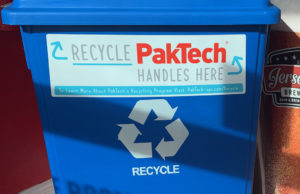
Aaron said they try to communicate quite often through social media and its partners the need for more sustainable efforts across many platforms of industry.
“We are connected to the local community so our best efforts are put into being a good corporate citizen,” Aaron said. “We plan to open a sustainability page on our website to capture the positive efforts and results.”
Jersey girl has also recently switched to supersacks. Previously, when using 55-pound bags for grain, the brewery donated the empty sacks to the Enactus program, a local team at Centenary College that took the bags and turned them into store shopping bags for consumer use.
“The program was a big success and they gained some national attention through the partnership,” Aaron said.



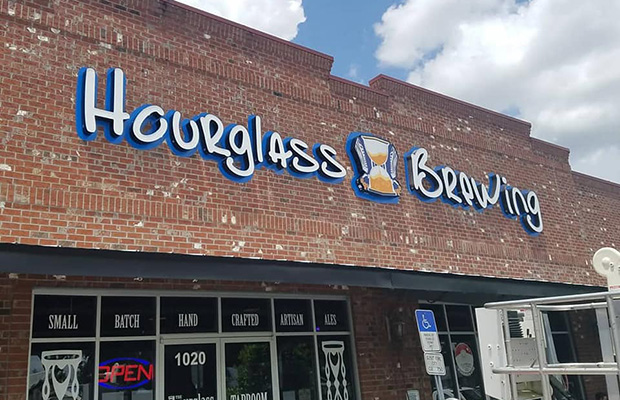
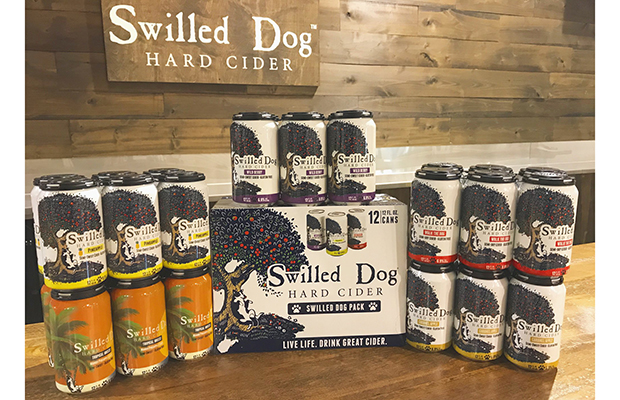

Be the first to comment